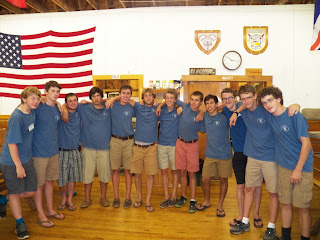If I asked my boys what they love about Camp, they would
mention many things: the food, making new friends, overnight hikes and canoe
trips, the food, Olympic Day, Goldrush, the food, riflery, archery, and the
FOOD! However, most certainly, the first answer they would give is the
counselors and staff. These relationships are what keep the boys coming
back and what makes each year’s camp experience so very special, memorable, and
unique. What is it like to be a Leader in Training (LIT) or staff member
at William Lawrence Camp? We asked some two seasoned counselors to let us in on what it’s like to be the “secret
sauce” of the WLC experience.
One is eligible to become an LIT as long as he is in 10th
grade or, if International, is age 17. The LIT Internship is often a
natural progression for campers who have come up through the ranks and have
completed their Senior camper years. Adam Muhith, who was a camper for five years before becoming an LIT and
remains a valued staff member to this day, says the choice to become a
counselor was easy. “My last year as a camper I knew that I wanted to keep
coming back, and that I wanted both to see what it was like as a counselor and
to ensure that future generations of campers had just as good an experience as
I did.” LITs and staff hail from not only the U.S., but also all
over the world. Says Kyle Schophaus about his decision to become a WLC
counselor, “I have worked in the
camping industry in South Africa and always wanted to know what it would be
like to work at a proper summer camp.”
In addition to receiving a world of experience in managing
and molding the lives of younger campers, there are many practical benefits to
the Internship, including trip leader, belay and American Red Cross lifeguard
certifications, and even writing opportunities in the form of drafting your
college essay and publishing a blog post on the WLC website. LITs gain all of
this training while continuing to enjoy the traditions of camp and sharing them
and making memories with experienced and new campers alike. To this point,
Schophaus adds, “You are free to be
your own person and you are encouraged to be that person all the time.” In
fact, Muhith explains, some of the greatest lessons are less tangible. “Being
an LIT taught me that it’s okay to say that I don’t know how to do something
and how to ask for help on a project. Knowing when to stop and acknowledge that
you don’t know, or when to ask for help, or when to bring in a second set of
eyes for a project is a simple skill that really goes a long way. It was
something that I had to do almost daily as an LIT. The entire program is a
learning experience like no other, and its value can’t be overstated.”
Being a WLC staff member not only trains young men to be
leaders in the camp environment, but it teaches them skills that can be applied
much later on and throughout their lives. Says Muhith, “Most
of all though, working at WLC has helped me further my love for the outdoors –
in the off-season, I work as both a camping trip guide and at a climbing wall.
I never would’ve learned the necessary skills to do these, the two things I
love best, had it not been for the bounty of knowledge passed on to me from so
many different leaders and co-counselors.” Schophaus adds,
“It has helped me to be more
confident and think way more out of the box then I normally do.”


